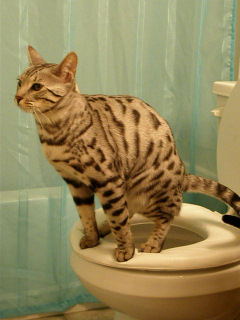Don't Flush Cat Poop Down Your Toilet - Maintain Your Home's Plumbing Integrity
Don't Flush Cat Poop Down Your Toilet - Maintain Your Home's Plumbing Integrity
Blog Article
What're your thoughts with regards to How to Dispose of Cat Poop and Litter Without Plastic Bags?

Intro
As cat owners, it's important to be mindful of exactly how we dispose of our feline pals' waste. While it might appear practical to purge feline poop down the commode, this technique can have harmful repercussions for both the atmosphere and human health and wellness.
Alternatives to Flushing
Luckily, there are much safer and much more responsible ways to dispose of pet cat poop. Think about the complying with alternatives:
1. Scoop and Dispose in Trash
One of the most typical method of dealing with cat poop is to scoop it right into a biodegradable bag and toss it in the trash. Make certain to utilize a dedicated trash scoop and throw away the waste quickly.
2. Usage Biodegradable Litter
Choose eco-friendly cat trash made from products such as corn or wheat. These litters are environmentally friendly and can be securely dealt with in the trash.
3. Hide in the Yard
If you have a backyard, consider burying pet cat waste in a designated area away from veggie yards and water sources. Make sure to dig deep enough to stop contamination of groundwater.
4. Mount a Pet Waste Disposal System
Purchase a pet garbage disposal system particularly created for feline waste. These systems utilize enzymes to break down the waste, minimizing smell and ecological effect.
Health Risks
Along with ecological worries, flushing cat waste can also posture health threats to people. Cat feces may consist of Toxoplasma gondii, a bloodsucker that can cause toxoplasmosis-- a possibly severe health problem, specifically for expectant females and individuals with damaged body immune systems.
Environmental Impact
Flushing pet cat poop introduces damaging pathogens and bloodsuckers into the water supply, posturing a substantial risk to marine environments. These contaminants can adversely impact aquatic life and compromise water top quality.
Conclusion
Liable animal possession expands beyond supplying food and shelter-- it likewise entails correct waste management. By refraining from flushing feline poop down the commode and opting for alternative disposal methods, we can reduce our environmental footprint and secure human health and wellness.
Why You Should Never Flush Cat Poop Down the Toilet
A rose by any other name might smell as sweet, but not all poop is created equal. Toilets, and our sewage systems, are designed for human excrement, not animal waste. It might seem like it couldn’t hurt to toss cat feces into the loo, but it’s not a good idea to flush cat poop in the toilet.
First and foremost, assuming your cat uses a litter box, any waste is going to have litter on it. And even the smallest amount of litter can wreak havoc on plumbing.
Over time, small amounts build up, filling up your septic system. Most litter sold today is clumping; it is made from a type of clay that hardens when it gets wet. Ever tried to scrape old clumps from the bottom of a litter box? You know just how cement-hard it can get!
Now imagine just a small clump of that stuck in your pipes. A simple de-clogger like Drano isn’t going to cut it. And that means it’s going to cost you big time to fix it.
Parasitic Contamination
Believe it or not, your healthy kitty may be harboring a nasty parasite. Only cats excrete Toxoplasma in their feces. Yet it rarely causes serious health issues in the cats that are infected. Most people will be fine too if infected. Only pregnant women and people with compromised immune systems are at risk. (If you’ve ever heard how women who are expecting are excused from litter cleaning duty, Toxoplasma is why.)
But other animals may have a problem if infected with the parasite. And human water treatment systems aren’t designed to handle it. As a result, the systems don’t remove the parasite before discharging wastewater into local waterways. Fish, shellfish, and other marine life — otters in particular — are susceptible to toxoplasma. If exposed, most will end up with brain damage and many will die.
Depending on the species of fish, they may end up on someone’s fish hook and, ultimately on someone’s dinner plate. If that someone has a chronic illness, they’re at risk.
Skip the Toilet Training
We know there are folks out there who like to toilet train their cats. And we give them props, it takes a lot of work. But thanks to the toxoplasma, it’s not a good idea.

We were made aware of that editorial about How to Dispose of Cat Poop and Litter Without Plastic Bags from an acquaintance on our other domain. Liked our write-up? Please share it. Let other people find it. We cherish reading our article about Can You Flush Cat Poop Down The Toilet?.
Get Your Estimate Now Report this page